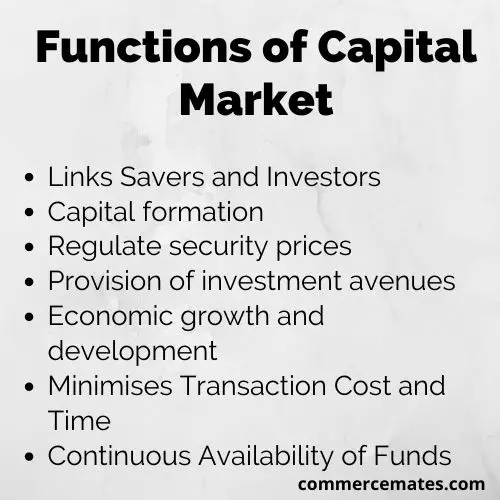Contents
Meaning of Capital Market
Capital market is a market for borrowing and lending of long-term finance that is for a period of more than one year. It is an organised financial market where saving and investment is channelled between the one who has sufficient money and one who is in need of money. Capital Market basically serves as the link between the savers and investors. This market involves trading of long term financial securities for raising and investing of long term finance.
The main types of instruments traded in capital markets are Debentures, Shares, Government securities and Bonds. There is a high degree of risk involved in the capital market as it involves long term investment. Capital market is of types: Primary market and secondary market. The primary market is known as the New issue Market. It is a market for the trading of new securities means which are traded for the first time. Methods like Right issue, Offer through the prospectus and Initial public offer are used here.
Whereas Secondary market is a market for the trading of old and existing securities. The secondary market is known as the stock market or stock exchange. The securities which were previously traded in the primary market are traded in the secondary market. Investors bring and sell securities in the secondary market. Capital market plays a wide range of important functions for the betterment of the economy which is discussed below.
Functions and Role of Capital Market

Links Savers and Investors
The capital market serves an intermediary between the people having excess funds and the ones who are in need of funds. It channels the ideal lying resources to more productive sources where it can generate income and increase productivity. It mobilises people’s savings by directing and guiding them for productive investment. These investments provide regular income and growth to the investors.
Capital formation
The capital market has an efficient role in capital formation in the economy. It fulfils and caters to the financial needs of different sectors of the economy by providing them with sufficient funds timely. It transfers funds from ideal lying sources to more productive and development sources.
It mobilises the saving of peoples through investments and lends that money for large development projects in the economy. This way it fulfils the overall fund requirement and helps in adding on to the existing stock of capital in the economy.
Regulate security prices
It helps in regulating the stable and systematic prices of securities. The capital market continuously monitors the trading of securities. It keeps an eye over whole processes and avoids any unproductive and speculative activities. Funds are provided at standard and minimum interest rates to the borrower. This helps in security prices stabilisation in the economy.
Provision of investment avenues
The capital market provides different long term investment avenues to the investors looking for long term investments. It deals in trading of long term securities thereby raising and lending money for long periods. It provides and offers good interest rates options to the people for investing their surplus funds. People are encouraged to invest their fund and earn regular income in the form of interest.
Economic growth and development
It helps in economic growth and development in the country. Capital market speeds up the economic growth rate in the country by providing funds among different sectors of the economy continuously.
It provides funds for the large infrastructural development requiring huge funds in the country. Long term finance requirement of various business houses are met by the capital market. Thereby it improves the productivity of the economy by improving infrastructural facilities and generation of employment.
Minimises Transaction Cost and Time
The capital market facilitates the trading of long-term securities. It reduces the overall cost and time involved in the whole trading process. The entire trading process is conducted electronically through automated systems and programs which speed up the entire process.
Continuous Availability of Funds
The capital market ensures the sufficient availability of funds in the economy. It continuously provides long term investment avenues to investors. It is a liquid market as buyers and sellers of securities are continuously available here. It always circulates funds among the different sectors of society, thereby ensuring adequate availability of funds.